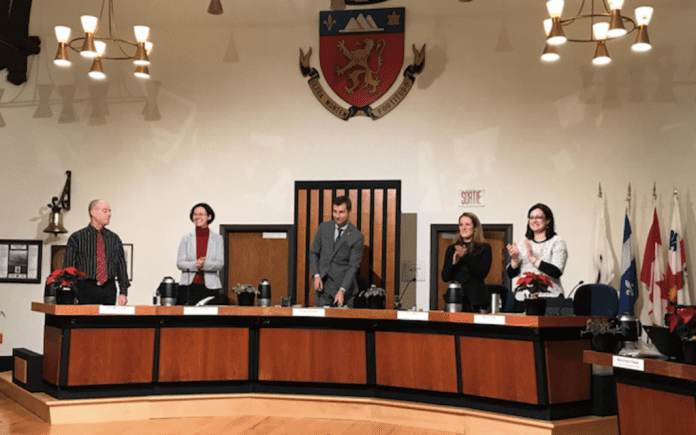‘IT WASN’T MY INTENTION TO BE A TRAILBLAZER OR A ROLE MODEL’
Canada’s first female Hasidic politician may be bound for parliament
Trilingual Montreal borough councilor Mindy Pollak is courted by at least one federal party as a potential candidate in the next national election
MONTREAL — On a recent Monday evening on Montreal’s east side, some 100 residents gathered in a century-old white building that since 1963 has served as the Council Chamber for the borough of Outremont. They were there to attend the monthly session of the local governing body.
Before the meeting officially began, the atmosphere in the large, high-ceilinged room was more charged than usual. One month prior, tensions soared when some residents were accused of using Holocaust imagery to protest the increasing number of yellow school buses used by the neighborhood’s Hasidic residents.
With people seated, the mayor and four councilors entered the room. A film crew stood by to capture material for an upcoming TV documentary on the fraught relationship between the area’s francophone majority and sizeable Hasidic minority that has been simmering for many years.
As the politicians made their appearance, Mindy Pollak stood out from the group due to her relatively young age and conservative attire.
Pollak, 29, seemed in her element. Before claiming her seat at the front of the chamber to the left of the mayor, she showed the aplomb of a seasoned politician. Reflecting her warm, friendly manner, Pollak made a point to greet individual residents, engaging them effortlessly in French or English. Among those in the audience was her mother, Elka, who attends all of the monthly meetings.
Pollak is negotiating unchartered territory for someone of her background. To her knowledge, no other Hasidic woman outside Israel has ever entered the political arena as she has.
Her closest counterpart is Rachel Freier, who became the first Hasidic woman elected to public office in the United States when she won the race for New York civil court judge in 2016.
Re-elected last November for her second term as a councilor in the Montreal borough of Outremont, Pollak is an astute, highly respected politician. She is now being courted by at least one federal party as a potential candidate in Canada’s next national election.
Since taking office, Pollak has helped change the perception of her oft-maligned Hasidic community, especially in Outremont where it’s been the focus of strained relations with non-Jews for many years.
“Every time I succeed in showing someone that we [Hasidic residents] are just normal human beings and that we have more things in common than not, I consider my mission accomplished,” says Pollak during a recent interview in her office in Outremont City Hall. “I enjoy surprising people and broadening their opinions of their Hasidic neighbors.”
For all her groundbreaking work, she remains modest about her achievements.
“It was never my intention to be a trailblazer or a role model,” says Pollak. “I just happened to be in the right place at the right time.”
Of course, it wasn’t so simple. When the Projet Montreal party asked her to be a candidate in the 2013 election, she wrestled with the decision. The novelty of an extremely religious, young, single Jewish woman running for political office in a secular environment rubbed some people the wrong way. Others dismissed her prospects for winning.
“When Projet Montreal announced Mindy as a candidate, many people were dismissive,” says Christian Aubry, 60, a non-Jewish neighbor and friend of Pollak who moved to Montreal from Paris in 1989. “Many Hasidic residents thought it was improper for a young Hasidic woman to step into the public eye, and a small group of Outremont residents ill-disposed to the so-called [Hasidic] ‘invaders’ didn’t take her seriously.”
It’s possible they do now.
A Hasidic mecca
Montreal is home to one of the largest Hasidic communities outside Israel, much of it concentrated in the largely residential, predominantly francophone borough of Outremont. Nearly a quarter of its 25,000 residents are Yiddish-speaking ultra-devout Jews. Their distinctive, austere attire and rigidly pious lifestyle contrast sharply with the strong hipster presence in the same area where many members of Quebec’s intelligentsia live. This juxtaposition sometimes makes for an uneasy co-existence.
“Some francophones see Outremont as more than just any neighborhood,” says local Jewish resident Eric Scott, 66, a filmmaker currently working on a documentary for Radio-Canada on the situation. “They see it as the heartland of Quebec’s cultural, political, economic and social elites.
“For some, the presence of a population that, for the most part, doesn’t speak their language, has no desire to integrate, has special religious requirements, uses an inordinate number of school buses to transport its increasing number of children, and holds celebrations that disrupt the peace and quiet, is perceived as a threat to Outremont’s identity,” said Scott.
Tensions between secular and Hasidic residents have long bedeviled the neighborhood. A small group of activists, some with anti-Semitic tendencies, have taken issue with aspects of the Hasidic religious, insular lifestyle. Local politics and controversial bylaws arguably aimed at the fast-growing Hasidic community have exacerbated relations.
A political career is born
Born in Montreal, Pollak is the second-youngest of five siblings. She’s lived her entire life in the neighborhood at the same address, first with her parents and now in a separate apartment in the same building. For many years, her British-raised mother and Montreal-born father owned a bridal-wear salon. Today, he does volunteer work while she manages a children’s clothing manufacturer and serves as an unofficial advisor to her daughter.
Pollak first became active in the community in 2011 while working as a beautician. Opposition to a proposed synagogue expansion led to a referendum on the project. During a fractious campaign, an unlikely local supporter of Hasidic residents emerged.
Leila Marshy, an outspoken, self-declared “militant Palestinian” was disturbed by the actions of some anti-Hasidic activists. She and Pollak founded a grassroots neighborhood organization and became good friends. Given Marshy’s strident views on the Israeli-Palestinian conflict, they don’t talk about it.
“We stay clear of the subject because we both agreed it was something we’d never see eye-to-eye on,” says Pollak, who’s been to Israel once, when she was 16. “If we wanted to work together on issues in Outremont she felt passionately about, we had to avoid discussing the Middle East.”
Although Marshy left the neighborhood a few years ago, the two remain good friends.
Due to Pollak’s work, which included joining an Outremont Council inter-cultural relations committee, Projet Montreal approached her to run in the 2013 election.
Pollak faced multiple challenges, especially as it was her first election campaign. She overcame misconceptions many voters had about religious Jews. Closer to home, in her own deeply traditional Hasidic community, some strongly opposed the idea of a woman entering the political fray.
Her gender wasn’t the only point of contention for Hasidic residents who had never fielded someone from their own ranks to run for election.
“There was an element of fear that I completely understood,” says Pollak, speaking in English, one of three languages she’s fluent in, the other two being French and Yiddish.
“Many were afraid it would be worse to have somebody from our own community representing us in council. I just felt the way we had always done things, voting for politicians over the years who promised us everything but delivered nothing hadn’t worked. I felt, let’s try something different and that’s how I justified it,” she says.
Not all black and white
Pollak’s family gave her their blessing to throw her hat in the ring. Ultimately, so did certain rabbis from her Vishnitzer sect who said if there was no other viable option to help the beleaguered Hasidic community, then a female candidate was acceptable as there was no clear prohibition against such an initiative.
Others were less understanding.
“From the outset, the more conservative groups in the Hasidic community rejected the whole idea of Mindy’s candidacy,” says local Hasidic activist Cheskie Weiss, 38. “For them, it was ethically wrong and compromised our standards. This was perfectly understandable, as traditionally women have not been public figures of the Hasidic community.”
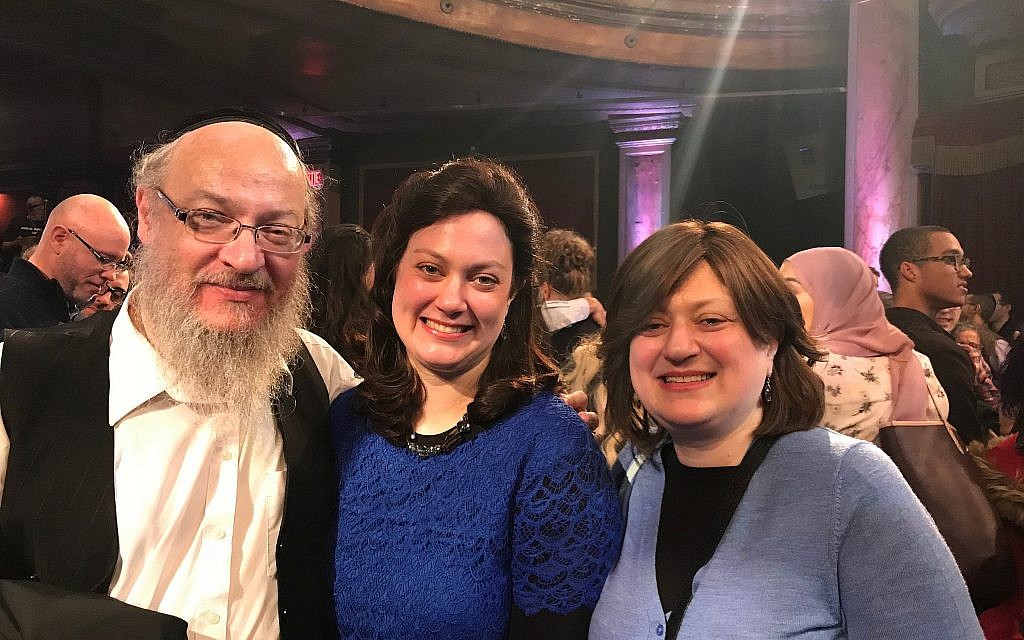

Negativity from her own community is clearly a sensitive subject for Pollak, who tried to sidestep it during her interview with The Times of Israel.
“To deal with the criticism, I developed a thick skin very quickly,” says Pollak, dressed in a long skirt and black cardigan sweater on which she sports an official City of Montreal pin she received when elected.
“From the start, I was convinced about what I was doing. I felt strongly this was something I was meant to be doing and that God had led me to do this to help my community,” she says.
Her Hasidic identity figured prominently in coverage of her victory in 2013. One French-language article began: “Mindy Pollak succeeded in getting elected to Outremont council without shaking hands with half of all voters,” referring to Hasidic women not shaking hands of men outside their families.
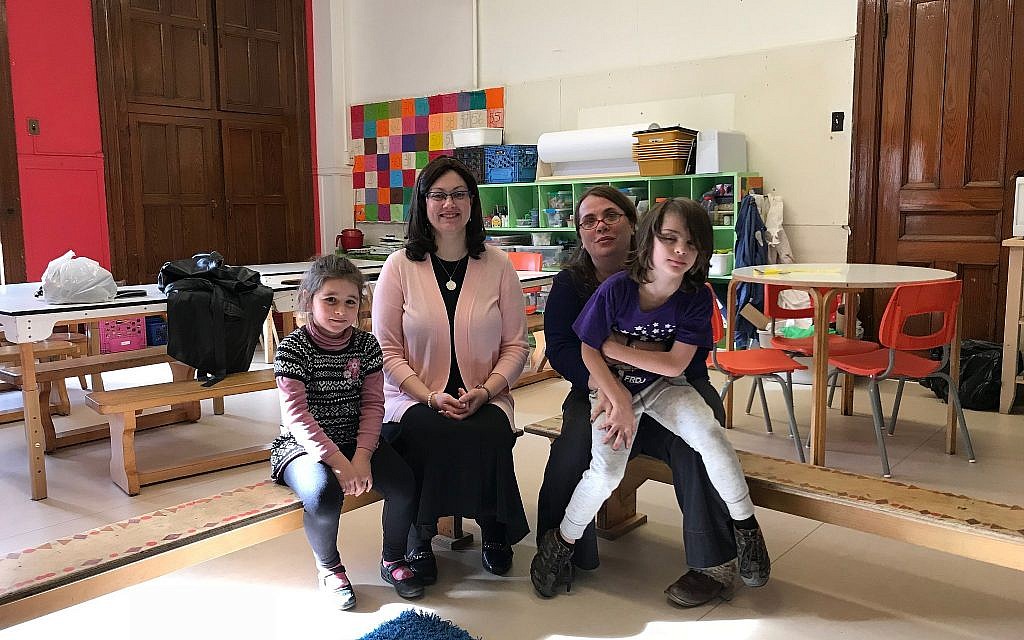

Five years later, she can point to gains made in establishing trust and understanding between her community and the Outremont Council. In the process, she’s won over many former naysayers, even if some Hasidic residents still reject the very notion of a woman from their own community partaking in the rough-and-tumble world of politics.
“Hasidic fears and opposition to Mindy being in politics have decreased considerably,” says Weiss, who runs a website he founded in 2009 to counter local anti-Hassidic bloggers.
“The initial concern was understandable. It was a new thing and people didn’t know what would happen to a woman in her position. But we’ve seen she has stayed true to her religion and culture and preserved everything she stands for. Still, we can’t say we want other women to follow suit because this isn’t what our tradition teaches about women,” Weiss says.
Standing her ground
Last November, Pollak was re-elected. It was sweeter this time, as she would no longer be the only Projet Montreal member on the Outremont Council. Three others won, including the new borough mayor. In a major upset, the party’s candidate to lead City Hall, Valérie Plante, defeated the incumbent to become the first woman elected mayor of Montreal.
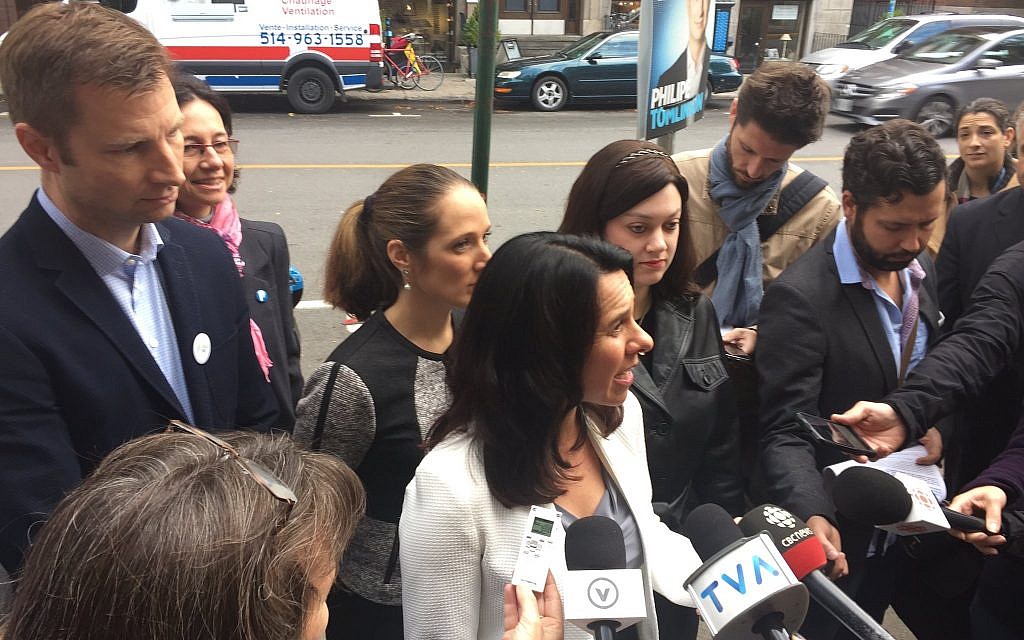

At a recent council meeting, Pollak showed a firm command of the multitude of urban issues on the agenda. Equally evident was the importance she places on interacting with residents.
“I love meeting new people,” says Pollak. “I love getting to know them, getting them to care about issues and to get involved. I just love people and connecting. My mom is a very warm, friendly, open person and has been an example to follow in relating to other people. She’s always been very friendly with all our neighbors, from all backgrounds, and that’s how she raised me.”
At the previous council meeting a month earlier, the scene was far more loaded. To protest the rising number of Hasidic school buses in Outremont, a small group of local residents appeared wearing yellow badges on their lapels, evoking the yellow patches Nazis forced Jews to wear during the Holocaust.
When several attendees, including non-Jews, told the protestors their badges were offensive for their resemblance to a symbol of Nazi oppression and genocide against Jews, the demonstrators refused to remove them. An angry exchange ensued and two people were expelled from the chamber.
Protest leader Ginette Chartre rejected criticism of the action. “[The Jews] always bring up their painful past,” she told Canadian Press. “They do it to muzzle us. We’re wearing the yellow square because the school buses are yellow.”
They include restrictions on sukkahs and school buses, to the use of speakers for parades (which affect processions for the dedication of new Torahs), the burning of bread (performed the morning before Passover), and building new places of worship. Not surprisingly, one of Pollak’s priorities is changing these bylaws. But she feels they are not the result of anti-Jewish prejudice.
“I don’t believe the majority of people who complain about things involving the Hasidic community are anti-Semitic,” says Pollak. “Most view these concerns as legitimate without relating to the fact they involve a certain community.
“Yes, Hasidim have large families which produce a lot of garbage. Yes, when Hasidim double-park, of course it’s more visible. Perhaps because the community is so visibly identifiable, there’s a disproportionate amount of negative attention, with lots of generalizations, stereotyping and blanket statements,” Pollak says.
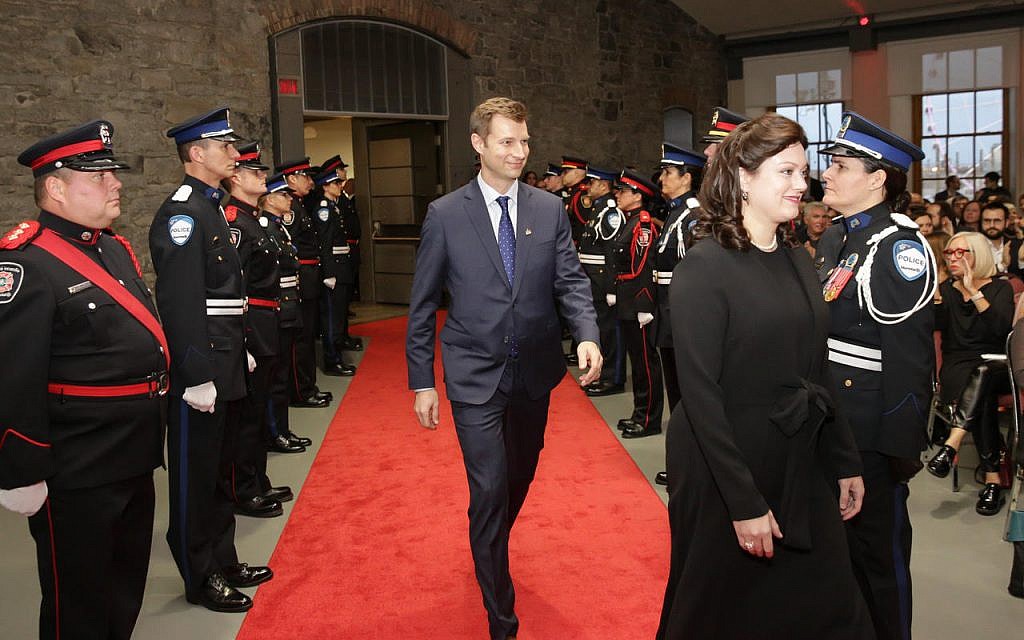

Yet Pollak doesn’t dismiss all criticism of the Hasidic community.
“There are certainly things we can improve on,” she concedes, “but when you look at those who come to council with grievances about the Hasidic community, it’s always the same few people. No matter what we do, some people will never be satisfied. So, it’s important we focus on encouraging mutual respect and good neighborliness.”
Common ground
Some suggest that both sides, despite their differences, have a similar perspective.
“The Quebecois francophone and Hasidic communities of Outremont share a ‘victim culture,’” says filmmaker Scott. “The latter see themselves as survivors of the Holocaust which wiped out their communities in Eastern Europe. Some Quebecois francophones see themselves as being under constant threat by forces undermining the French presence, and homogenizing it into the English-speaking North American norm.”
Although the job of borough councilor is supposed to be part-time and pays only $30,000 CAD per year, Pollak devotes most of her waking hours, except on Shabbat, to her work. It entails both Hasidic-focused issues and non-denominational urban matters such as roads, transportation and local infrastructure.


“I often work late because it’s quiet and I’ve always been a night owl,” says Pollak, who once co-founded a food blog, is active on social media and often catches up on her email after dark. “It works for me better that way. By now, people I work with are used to me sending them email well past midnight.”
For all the seriousness of her work, Pollak maintains a lively sense of humor. While being interviewed, she broke out in hearty laughter on many occasions.
“It’s very important to keep a sense of humor, especially when dealing with stressful situations,” says Pollak. “Laughter is the best medicine, as they say. Hasidic philosophy is full of joy.”
Currently unmarried, Pollak hopes for that to change soon.
“I’d very much like to settle down and have a family,” she says. “I’m just waiting for the right guy to come along.”
Pollak reluctantly admits one of the main federal political parties has asked her to be a candidate in a Montreal riding in the next national election in 2019, but won’t divulge which party.
“I told them no for now as I’ve haven’t finished my job in Outremont,” she explains.
When asked if that means she won’t be running in the next federal election, she answered coyly, “I don’t think so.”
Told that seemed to leave open the possibility, Pollak replied, with a big laugh, “I wouldn’t bank on it, but you never know.”
Source: The Times of Israel

